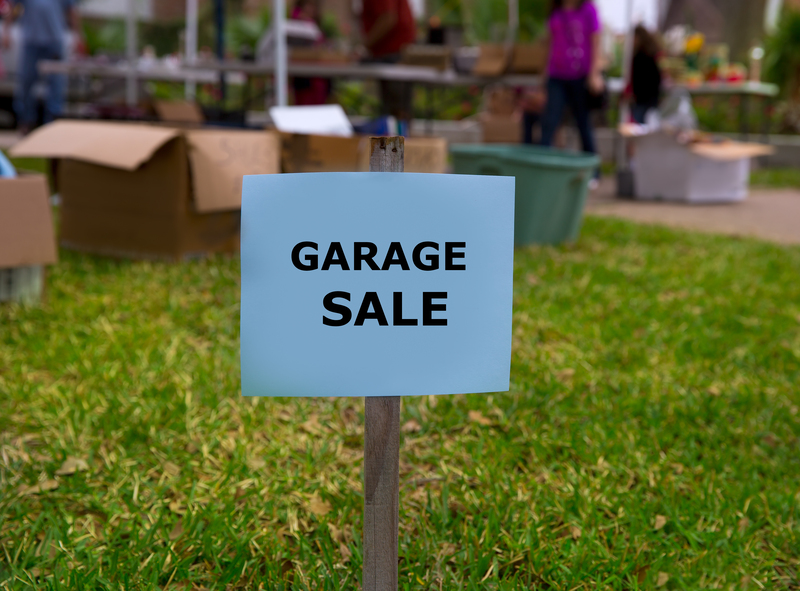Slash Your Bulky Waste Disposal Costs With These Expert Tips
Are you tired of facing steep charges every time you need to get rid of unwanted furniture, appliances, or other sizable refuse? Bulky waste disposal is a necessary but often expensive aspect of maintaining a tidy home or business. Fortunately, with the right strategies and a bit of know-how, you can dramatically cut down the expense without sacrificing convenience. In this comprehensive guide, we reveal expert tips and practical solutions to help you slash your bulky waste disposal costs and take control of your clean-up budget.
Understanding Bulky Waste and Disposal Costs
Before diving into cost-saving techniques, it's essential to know what constitutes bulky waste and why disposal charges can be so high. Bulky waste usually refers to items that are too big to be collected via regular garbage services--think sofas, mattresses, large appliances, and garden debris.
- Examples of bulky waste: Old beds, wardrobes, fridges, televisions, exercise equipment, lawn mowers, carpets, bathtubs, and doors.
- Why costs add up: Disposal fees often cover labor, truck transportation, transfer station fees, recycling, and landfill taxes. Larger or heavier items are more expensive due to the extra effort and space involved in handling them.
- Environmental regulations: Some materials require special processing or are banned from landfills, which can further increase disposal costs.
The good news is that with some planning and these expert tips, you can save money on bulky waste removal and even repurpose or recycle items, making your actions more eco-friendly as well.

Expert Tips for Reducing Bulky Waste Disposal Costs
1. Declutter and Separate Before Disposal
One of the biggest mistakes people make is disposing of everything together. By taking the time to sort and declutter before you schedule a collection or hire a service, you can minimize the total volume and weight--a direct cost saver.
- List and measure: Catalogue all items you plan to dispose of. Measure them because some services charge by volume or dimensions.
- Keep what you can: Assess each item honestly. Could it be repaired, refurbished, or still used? Keeping or repurposing items means less to dispose of.
- Avoid mixing waste: Separate recyclables (metals, electronics), hazardous waste (paint, chemicals), and general refuse. Specialized services handle each category, so separating can significantly cut costs.
2. Utilize Free or Low-Cost Community Options
Many municipalities offer free bulky waste pick-up for residents as part of their public services. Others may have specific collection days or designated drop-off centers.
- Check your local council's website: Search for "bulky item collection" and look for details about upcoming schedules or booking procedures.
- Community recycling centres: Some allow you to drop off items at little or no cost. These are perfect for furniture, scrap metal, e-waste, and garden refuse.
- Charity organizations: Local charities or social enterprises may pick up items like beds, couches, and appliances free of charge, especially if they're reusable.
*Tip: Booking early is recommended--these services often have limited slots and may require advance scheduling.*
3. Sell, Donate, or Give Away Items
Don't assume that nobody wants your old stuff. One person's trash is another's treasure! By selling or donating, you not only reduce waste but can even make some cash or get a tax deduction.
- Online marketplaces: Post your bulky items on platforms like Craigslist, Facebook Marketplace, Freecycle, or Gumtree. Be honest in descriptions and offer them for free if time is a constraint.
- Charity shops: Many charities accept quality furniture and household goods, and some will collect at no cost. Think British Heart Foundation, Habitat for Humanity, or local shelters.
- Local give-away groups: Search community boards and apps. List items--in many cases, people will collect them swiftly, sparing you the hauling expense.
Saving on disposal not only benefits your wallet but helps your community and environment, too.
4. Break Down Large Items Yourself
Many professional bulky waste collection companies and landfill services charge by the item or by the cubic yard. Disassembling and compacting items like beds, sofas, or shelving can result in significant savings.
- Tools help: With basic tools, you can reduce large furniture into flat pieces or manageable sections.
- Remove metal/wiring: Strip out metal, wiring, or other materials separately--these may be recycled for free or at a credit.
- Bag and bundle: Smaller, bundled items (like wood planks) are cost-effective to dispose of and easier to transport.
5. Pool Resources With Neighbors or Friends
If you're disposing of bulky waste alongside a home renovation, spring clean, or after a move, chances are your neighbors might be in the same boat. Combine efforts to save money!
- Hire a skip or dumpster together: Sharing the cost leads to much lower per-person charges. Just make sure to agree on accepted materials and who's responsible for what gets thrown in.
- Book a group collection: Some companies or councils offer "streetside" collections. A coordinated neighborhood effort maximizes value.
- Carpool to the recycling center: If you can transport lighter items, splitting fuel and tipping fees with friends means considerable savings.
6. Compare Professional Bulky Waste Removal Services
While hiring a bulky waste removal company can be very convenient--especially for heavy or awkward items--not all services are priced equally. Shop around!
- Request detailed quotes: Ask for itemized estimates, including labor, transportation, and disposal/tipping fees. Make sure there are no hidden 'extras'.
- Check for discounts: Some companies offer deals for first-time customers, students, pensioners, or off-peak collections.
- Ask about recycling: Eco-friendly companies who divert waste from landfill may offer lower prices for materials they can recycle or resell.
By doing your research and negotiating, you'll avoid overpaying and reduce your bulky waste disposal bill.
7. Rent a Van and DIY
If you have the time and ability, do-it-yourself transportation to a waste transfer station or recycling facility could save you a small fortune.
- Hire a small van: Rates are often very affordable by the hour or day. Make sure you know the recycling center's hours and rules.
- Enlist a friend: Two sets of hands make light work! Remember to use proper lifting techniques to prevent injury.
- Sort in advance: Pre-sort your load to save time and avoid extra charges at the facility.
This method requires effort but lets you control the cost and the process directly.
8. Consider Specialist Removal for Hazardous and E-waste
Not everything can or should go in a regular landfill. Some items, like refrigerators, televisions, or old paint, are classed as hazardous waste or require special handling.
- Check local events: Councils or environmental groups often host "e-waste" recycling days or hazardous waste amnesty events, allowing you to drop off items for free or at a significant discount.
- Rebate programs: Electronics retailers sometimes offer a discount if you bring in an old item for recycling when purchasing a replacement.
- Manufacturer take-back: Some brands offer free or subsidized collection of old appliances and batteries. Always check before disposing of such items yourself.
Following regulations isn't just about savings--it's about legal compliance and protecting the environment.
Frequently Asked Questions: Bulky Waste Disposal Savings
Is it always cheaper to hire a skip?
Not necessarily. For small or infrequent loads, council services or car boot sales might be far cheaper. Skips offer value for larger, mixed-material jobs shared across multiple households.
Can I leave bulky items at the curb for free pickup?
Rules vary. Many cities require booking or permits, and illegal dumping could incur hefty fines. Always check with your local waste authority to stay compliant.
Which bulky waste items are most expensive to dispose of?
Usually, mattresses, refrigerators (due to refrigerant gases), and certain electronics attract higher fees. Disassembling, recycling, or accessing a subsidized collection can offset these costs.
How can I make money from my bulky waste?
List items for sale or give away online; scrap yards may pay for metals; some charities provide tax receipts. The less you pay for disposal, the more in your pocket!

Sustainable Approaches to Bulky Waste Disposal
Saving money on bulky waste removal goes hand-in-hand with reducing environmental impact. Consider:
- Upcycling: Give old furniture a new lease of life.
- Recycling: Separate materials like metal, wood, and textiles for specific disposal streams.
- Composting: Green waste and untreated wood can be composted or mulched.
- Community swaps: Arrange neighborhood swap events to pass on usable goods.
Key Takeaways: Slash Your Bulky Waste Disposal Costs
- Plan ahead and declutter to minimize what you must dispose of.
- Tap into free community services and donation options before paying for removal.
- Break down items and sort materials to lower collection and landfill fees.
- Consider group arrangements with neighbors for shared savings.
- Compare multiple removal services and don't be afraid to negotiate.
- Always check regulations for hazardous and electronic waste.
Conclusion: Take Control of Your Bulky Waste Disposal Bills
With the expert tips above, you can slash your bulky waste disposal costs easily and responsibly. Whether you're a homeowner, tenant, or business owner, the keys are preparation, research, and community collaboration. Never underestimate the power of selling, donating, or simply sharing the disposal load with others. With a little effort, you'll keep more money in your pocket--and less waste in the landfill.
Looking for more home and waste management savings? Bookmark our site for regular tips on frugal, smart, and eco-conscious living!